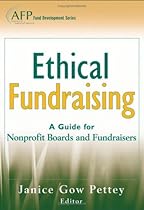We have been solicited by a sponsor to potentially receive a large donation. The sponsor is not making the donation but we are told that if they recommend us that we will get funding from the donor. The unknown that we are concerned about is that the sponsor is requesting that we "rebate" to them 50% of the donation. Do we have any problem in doing that and how would that be done?
It is not entirely clear from what you said how this gift will actually be made. I can think of two possible situations you could be describing. One would involve a donor adviser to a donor advised fund held by a public charity. It is impermissible to make a grant from a donor advised fund that personally benefits the donor adviser and if the adviser is the person who solicits or receives the rebate, this would probably be legally improper.
Most likely, however, you are describing the old “finders fee” situation that was so prevalent 20 years or so ago. In this situation, an adviser to a major donor who didn’t have a particular charitable interest would solicit a finders fee — some would call it a “kick-back” — in return for steering the gift to a particular charity. Often the gift vehicle was a charitable remainder trust the donor wanted to create for its income potential and current charitable deduction. The donor didn’t particularly care what charity received the remainder. The finder would peddle the gift to the organization willing to pay the highest finders fee, often without telling the donor about the arrangement. It may not be illegal, but the Association of Fundraising Professionals, the Partnership for Philanthropic Planning, and other professional fundraising associations have said that finders fees are unethical and are never appropriate.
Depending on the circumstances of your deal, the adviser may have to register as a fundraising counsel or solicitor under state charitable solicitation registration laws in order to claim compensation in connection with the gift. The finder probably hasn’t done so.
It may be tempting to make this kind of deal — whatever you get is “found money” — but it would undermine the standards of the fundraising profession and the public trust in charitable contributions. Your sponsor will emerge with a rebate that hasn’t been earned and the donor’s gift to charity will be cut in half. It’s probably not the kind of transaction you would like to be associated with when written up on the front page of the local newspaper.
For more information on fundraising ethical standards consider this text;
Ethical Fundraising: A Guide for Nonprofit Boards and Fundraisers (AFP Fund Development Series)
 By Janice Gow Pettey
By Janice Gow Pettey
Ethical Fundraising: A Guide for Nonprofit Boards and Fundraisers is a practical, helpful, and ultimately inspiring resource for nonprofits large and small, young and mature, local and international. The insightful guidance and case studies found within these pages will help you understand how to address specific ethical issues within your nonprofit and leave plenty of food for thought and discussion.

Comments
Just from a common sense approach, I see no big problem with reimbursing someone for work they do on behalf of a charitable organization. The person who directs a donor toward a particular charity deserves some compensation. BUT 50% seems way out of line. I knew someone many years ago who did this sort of work but he took 10%.
To the charitable organization which posed the question, I would say, "Stay away from this offer!"
Add new comment